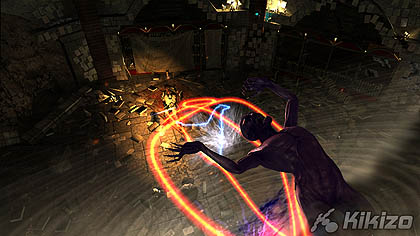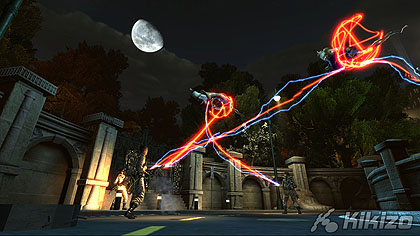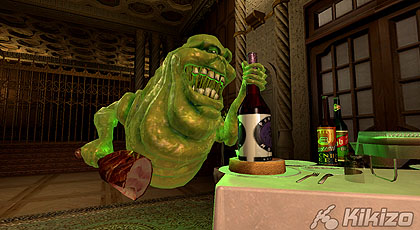Ghostbusters: Terminal Reality Interview
Plenty of new detail revealed in this interview with Ghostbusters: The Video Game developers, Terminal Reality's Mike Douglas and Drew Haworth.
Page 2
Kikizo: Sony have taken a long time getting round to partnering with somebody to make a Ghostbusters game - they've claimed it was because they were waiting for a developer to do it justice. Why would you say that ended up being you?
Douglas: Well, being a new guy - I started here about a year ago -every impression I got was that they poured so much effort and time into making sure that they got it right, that it really impressed Sony. The first thing that I noticed when I came aboard was that they'd just nailed the feel of being a Ghostbuster. Even with early dialogue, without actual recordings from the original cast at that point, it was clear that there was something special there, and it really impressed those guys, gave them the confidence to trust us with the license.
Haworth: The situation is that we were visiting Vivendi Universal at the time, and we were showing a different IP - an original IP - that we worked on, and also showing off our engine technology. So this is all proprietary technology that we're using, the Infernal engine. And they mentioned that Ghostbusters might be available.
We went directly back to the office - we cancelled the rest of our trip - and in two weeks we had a fully working ball room for the hotel scene, and Slimer, and proxy Ghostbusters with proton streams up and running. And so we had to prove it, and we did prove it a number of times with Sony, there were a couple of things - not just with Sony, the other owners. We realised that we did need to bring it every time and so we did that, and we did a progression of visual demos and gameplay demos that convinced them.
So I wouldn't say it was a discovery like "Oh look!" - we came back many times to show them.
Kikizo: How did you manage to put together all the assets so quickly, to come up with that demo fast?
Haworth: We were really, really dedicated to it, and we had a lot of guys working on it!
Kikizo: You just designed it from scratch?
Haworth: Well, when you're just doing a room it isn't all that hard, and like I say we had the structure, we had a lot of the physics stuff - we just applied our technology to it. The trickiest part was the proton stream, but it was right pretty much right off the bat.
Kikizo: A company called Zootfly released demo footage of what they claimed was an unlicensed Ghostbusters game back in 2007 - the project is now going forward as a new IP. There was a lot of interest in that. Did it have a bearing on you or the license holders at all?
Haworth: We had actually been working for about eight months on the Ghostbusters game in total secrecy when that surfaced, so while the positive reaction certainly reinforced to whoever was looking that there should be a Ghostbusters game here, we were already under contract. [It was called] "Proton" at the time - we were not allowed to say Ghostbusters 3...
Kikizo: In the levels that you've shown us, the ghosts seem to be confined to certain areas. What's the logic behind that? Is it akin to a hack-and-slash experience, with the player working his way through areas and the same enemies repeating?
Haworth: That's a good question. Each area definitely has its distinct ghosts, those that are representative of each area - however, there are ghosts who float through all those levels. So there's continuity, and that also teaches the player how to react to certain types of ghosts. We do some different things to identify the types of ghosts you're fighting...
Douglas: There are certainly areas in the game where it's different - Stay Puft's return, for example - we're not talking too much about him yet - there is a very good reason for him to make a return, but the sequence that involves him actually involves spawning enemies, it's a little more dynamic. We do punctuate it with scares and these instances where ghosts appear in logical ways in the environment.








 Satoru Iwata Video Interview - the late Nintendo president spoke with Kikizo in 2004 as 'Nintendo Revolution' loomed.
Satoru Iwata Video Interview - the late Nintendo president spoke with Kikizo in 2004 as 'Nintendo Revolution' loomed. Kaz Hirai Video Interview - the first of Kikizo's interviews with the man who went on to become global head of Sony.
Kaz Hirai Video Interview - the first of Kikizo's interviews with the man who went on to become global head of Sony. Ed Fries Video Interview - one of Xbox's founders discusses an epic journey from Excel to Xbox.
Ed Fries Video Interview - one of Xbox's founders discusses an epic journey from Excel to Xbox. Yu Suzuki, the Kikizo Interview - we spend time with one of gaming's most revered creators.
Yu Suzuki, the Kikizo Interview - we spend time with one of gaming's most revered creators. Tetris - The Making of an Icon: Alexey Pajitnov and Henk Rogers reveal the fascinating story behind Tetris
Tetris - The Making of an Icon: Alexey Pajitnov and Henk Rogers reveal the fascinating story behind Tetris Rare founders, Chris and Tim Stamper - their only interview? Genuinely 'rare' sit down with founders of the legendary studio.
Rare founders, Chris and Tim Stamper - their only interview? Genuinely 'rare' sit down with founders of the legendary studio. The History of First-Person Shooters - a retrospective, from Maze War to Modern Warfare
The History of First-Person Shooters - a retrospective, from Maze War to Modern Warfare